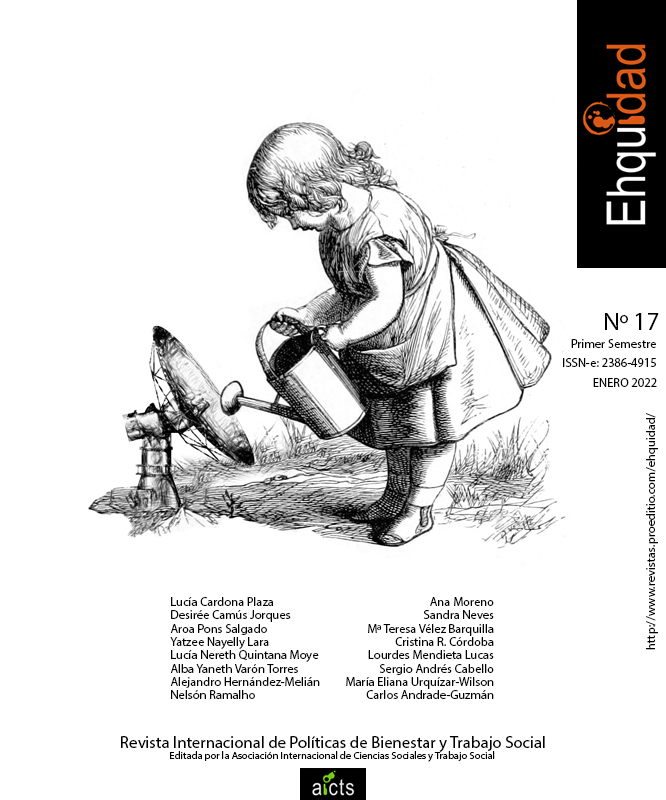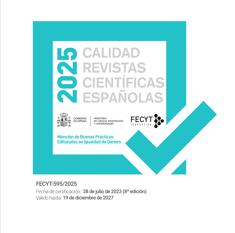The Intervention of the Social Service in the Multidisciplinary Teams to Combat COVID-19.
The Case of the Municipality of Amadora (Portugal)
DOI:
https://doi.org/10.15257/ehquidad.2022.0005Keywords:
COVID-19, Multidisciplinary Teams, Social Work, Amadora (Portugal)Abstract
The creation of Multidisciplinary Teams to monitor patients with COVID-19 and those infected with SARS-CoV-2 in a situation of home confinement was one of the measures established by the Portuguese government to help stop the spreading of the infection in the parishes of the Lisbon Metropolitan Area more affected by the pandemic. To know its way of functioning and acting, as well as the role of social workers in the context of crisis and public health emergency, a qualitative study was developed based on interviews by focus groups and document analysis. It was found that the Multidisciplinary Teams and the intervention model carried out were fundamental in helping to break the transmission chains and prevent the growth of new contamination, with social workers having a crucial role in supporting the most vulnerable households in a containment situation.
Downloads
References
Banks, S., Cai, T., de Jonge, E., Shears, J., Shum, M., Sobo?an, A., Strom, K., Truell, R., Úriz, M., e Weinberg, M. (2020). Ethical challenges for social workers during Covid-19: A global perspective. International Federation of Social Workers.
Bardin, L. (2013). Análise de conteúdo. Coimbra, Edições 70.
Carvalho, M. I. (2020). Serviço social em catástrofes: Intervenção em crise e emergência social. Lisboa, Pactor.
Conselho de Ministros (30 de abril 2020). Plano de desconfinamento. https://www.portugal.gov.pt/pt/gc22/comunicacao/documento?i=plano-de-desconfinamento
Conselho de Ministros (25 de julho 2020). Evolução, critérios e medidas. https://ipdj.gov.pt/documents/20123/287455/Apresentacao-desconfinamento-24junho_4.pdf/807d4cd9-cffc-1d59-f05b-3ebcf95e4d34?t=1593181288866
Direção-Geral da Saúde (30 de dezembro 2020). Covid-19 | Equipas de LVT. https://www.sns.gov.pt/noticias/2020/12/30/covid-19-equipas-de-lvt-3/
Despacho n.º 6451/2020 do Gabinete da Ministra (2020). Diário da República: II série, n.º 118. https://dre.pt/application/conteudo/136167763
Expresso (14 de agosto de 2020). Seis concelhos da Grande Lisboa vão ter reforço de equipas. https://expresso.pt/sociedade/2020-08-14-Covid-19.-Seis-concelhos-da-Grande-Lisboa-vao-ter-reforco-de-equipas
Maxwell, J. (2005). Qualitative research design: An interactive approach. Sage Publications.
Park, H., e Lee, B. (2016). The role of social work for foreign residents in an epidemic: The MERS crisis in the Republic of Korea. Social Work in Public Health, 31(7), 656–664. DOI: 10.1080/19371918.2016.1160352
Patton, M. (2002). Qualitative research and evaluation methods (3ª ed.). Sage Publications.
Payne, M. (2002). Teoria do trabalho social moderno. Coimbra, Quarteto.
PORDATA (2020). Densidade populacional. https://www.pordata.pt/Municipios/Densidade+populacional-452
Resolução do Conselho de Ministros nº 51-A/2020 da Presidência do Conselho de Ministros (2020). Diário da República: I série, n.º 123. https://dre.pt/application/conteudo/136788888
Serviço de Fronteiras e Estrangeiros (2020). Relatório de imigração, fronteiras e asilo 2020. Serviço de Estrangeiros e Fronteiras.
Silva, J., Bernard, A., Espiga, F., e Gaspar, M. (2021). O impacto da Covid-19 na Pobreza e Desigualdade em Portugal, e o efeito mitigador das políticas de proteção. Observatório Social da Fundação “La Caixa”.
Sweet, C. (2001). Designing and conducting virtual focus groups. Qualitative Market Research: An International Journal, 4(3), 130–135. https://doi.org/10.1108/13522750110393035
Thomas, D. R. (2006). A general inductive approach for analyzing qualitative evaluation data. American Journal of Evaluation, 27(2), 237–246. https://doi.org/10.1177/1098214005283748
Vala, J. (2014). A análise de conteúdo (16ª ed.). Em A. Silva e J. Pinto (Orgs.), Metodologia das Ciências Sociais (pp. 101 – 128). Porto, Edições Afrontamento.












